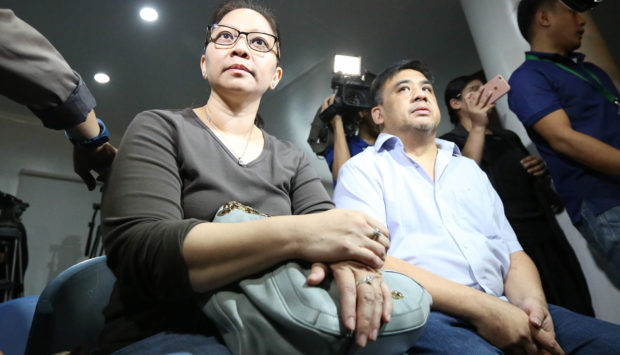
The parents of slain UST law student Horacio “Atio” Castillo III — Carmina and Horacio Jr. — during inquest proceedings at the DOJ on September 25 (Monday). INQUIRER FILE PHOTO/ MARIANNE BERMUDEZ
The University of Santo Tomas (UST) remains silent on Senate’s findings in the hazing death of law freshman Horacio “Atio” Castillo III and the victim’s mother finds the Catholic school’s silence “deafening.”
In a recent phone interview with the Inquirer, Carmina Castillo said UST had “never” reached out to her family since Atio died in September last year.
“It’s very disappointing,” Castillo said. “The silence is deafening.”
Last week, the Senate committee on public order and dangerous drugs that investigated Atio’s death released its report, recommending the disbarment of or disciplinary action against lawyer Nilo Divina, dean of the UST College of Law, and 18 other lawyers who belonged to the Aegis Juris fraternity for their roles in the fatal hazing of the law student.
Divina and other fraternity members denied any wrongdoing. But the committee headed by Sen. Panfilo Lacson refused to believe them.
The report also said that student witnesses might refuse to come out as long as Divina remained at his post in the university.
The committee also admonished UST for failing to implement the antihazing law. It urged the university to perpetually ban Aegis Juris.
Not ready to comment
The Inquirer has called UST’s public information office twice, each time being told the school was not ready to comment on the Senate inquiry’s findings.
Castillo said she found it perplexing that UST could take a stand on issues such as the firing of the university’s basketball coach yet be tight-lipped on the hazing death of her son.
“That’s just basketball. Is that more important than a crime committed by its students and faculty? We are talking about a crime because those who did this to my son are criminals. They are criminals,” she said.
Castillo also noted how the university swiftly distanced itself from the government service award that the UST Alumni Assocation gave to Assistant Communication Secretary Mocha Uson but couldn’t immediately make a stand on her son’s case.
When asked whether the university helped the investigation, Castillo said: “No, never.”
She said it was the Manila Police District that did all the hard work.
“The problem is not UST itself but the people who are running it,” she added.